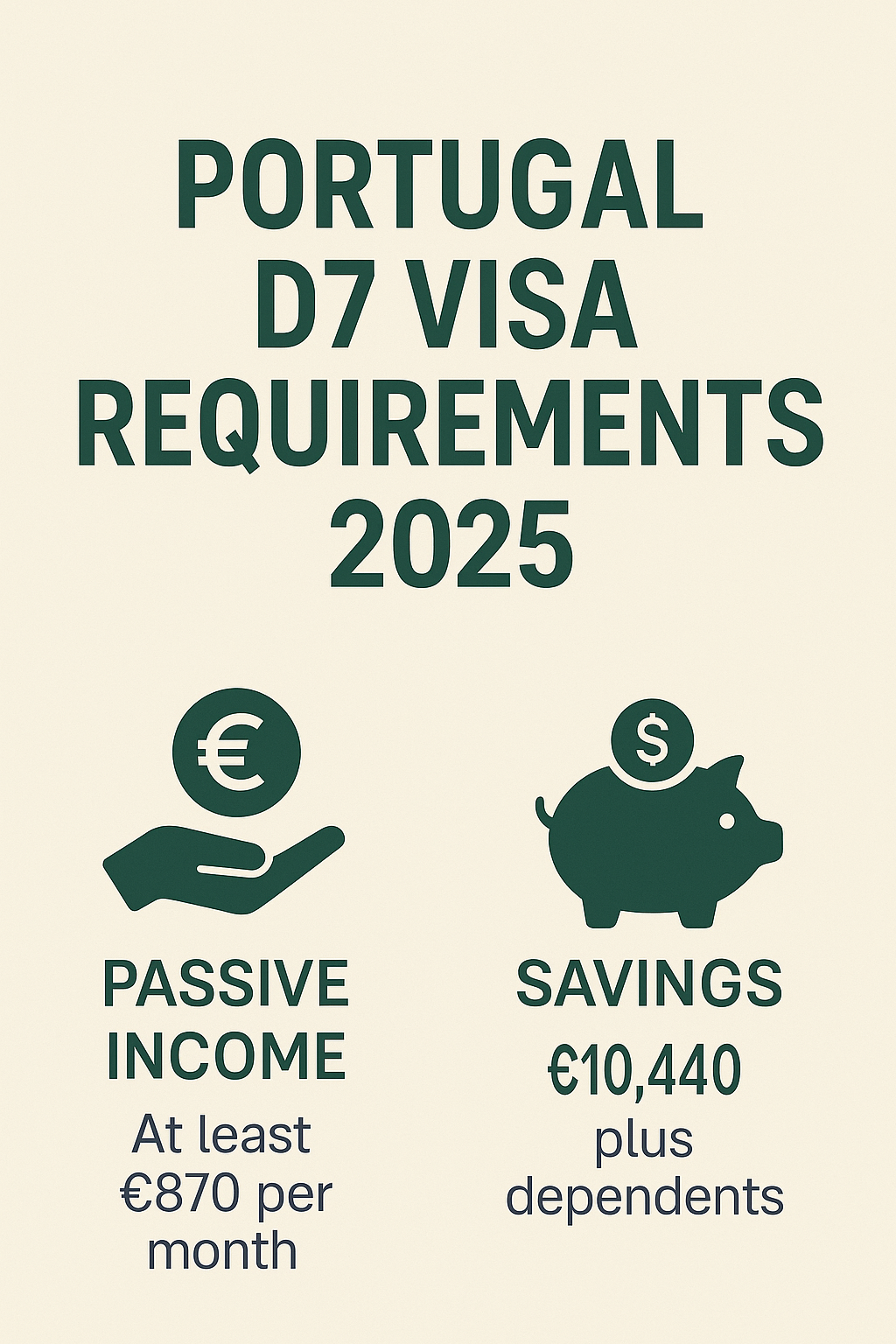Portugal D7 Visa Financial Requirements Explained: Passive Income and Savings
The Portugal D7 visa has become one of the most attractive residency options for non-EU citizens seeking to live in Portugal. Designed for retirees and individuals with stable passive income, the D7 allows applicants and their families to establish residence in Portugal and, eventually, apply for citizenship. But how much passive income or savings do you really need to qualify? And what financial planning considerations should you be aware of in 2025?
In this article, we break down the D7 visa financial requirements and share critical insights on currency devaluation risks and planning.
What Is the D7 Visa?
The D7 visa, often referred to as the “Passive Income Visa,” is intended for individuals who can sustain themselves without working in Portugal. Typical applicants include:
- Retirees with pensions
- Investors with dividend income
- Individuals earning royalties, rental income, or interest
This visa provides a path to Portuguese residency and citizenship (currently after five years, though proposed legislation may extend this to seven or ten years).
Portugal D7 Visa Financial Requirements
Minimum Passive Income
To qualify, applicants must demonstrate a minimum level of passive income to support themselves and any dependents. As of 2025, the requirements are tied to Portugal’s current minimum wage (Salário Mínimo Nacional): €870 per month.
- Main Applicant: 100% of the minimum wage – €870/month
- Spouse or Partner: 50% – €435/month
- Each Dependent Child: 30% – €261/month
Mandatory Savings in a Portuguese Bank Account
In addition to passive income, applicants are required to hold sufficient savings deposited in a Portuguese bank account.
The threshold for savings is calculated as:
- Main Applicant: €10,440 (12 x €870)
- Spouse or Partner: Additional 50% – €5,220
- Each Dependent Child: Additional 30% per child – €3,132 per child
Example
A family of four (main applicant, spouse, two children) would need:
€10,440 + €5,220 + (€3,132 x 2) = €21,924 in savingsThis amount must be deposited in a Portuguese bank account and presented as proof of financial means during the application process.
Passive Income Sources That Qualify
The Portuguese authorities recognize several types of passive income:
- Pensions
- Dividends from investments
- Rental income from real estate
- Royalties
- Interest from savings or bonds
- Certain annuities
Planning for Currency Devaluation
One often-overlooked factor for D7 applicants is currency fluctuation. If your passive income is in a currency other than the euro (EUR), you must plan for potential devaluation.
Case Study: USD in 2025
In 2025, the US dollar (USD) saw significant devaluation against the euro, partly due to economic policy shifts and global market volatility.
For example:
- January 2025: 1 USD = 0.92 EUR
- July 2025: 1 USD = 0.85 EUR
This 7.6% decline meant that a retiree receiving $3,000/month saw their euro equivalent drop from €2,760 to €2,550 – a loss of €210/month.
How to Mitigate Currency Risk
Hold Euros in a Portuguese Bank Account Convert part of your savings into euros to avoid exchange rate shocks.
Diversify Income Sources Consider investments that pay dividends in euros or hold multi-currency assets.
Use Hedging Strategies Explore financial products that hedge currency exposure.
Build a Buffer Plan for a 10-15% cushion in your income projections to account for fluctuations.
Additional Financial Considerations
Cost of Living in Portugal
While Portugal is more affordable than many Western countries, costs vary by region:
- Lisbon and Porto: Higher rents and living expenses
- Algarve and smaller towns: More budget-friendly
Average monthly expenses for a single person (excluding rent): €800-€1,000.
Health Insurance Requirement
Applicants must also show proof of comprehensive health insurance valid in Portugal. Costs typically range from €50-€150/month per person.
Final Thoughts: Are You Financially Ready?
The D7 visa is an excellent option for individuals with stable passive income and mandatory savings in Portugal. But 2025 applicants must be especially cautious of currency risks and plan accordingly.
Here’s a quick checklist:
- Confirm your passive income meets or exceeds the thresholds (€870/month for the main applicant, plus €435/month per spouse and €261/month per child)
- Deposit the mandatory savings (€10,440 + dependents) into a Portuguese bank account well before your application
- Prepare a currency risk management strategy to protect your income against devaluation
- Arrange comprehensive private health insurance for all applicants and dependents
By proactively managing these factors, you can ensure a smooth application process and a secure start to your new life in Portugal.
Need Legal Support for Your D7 Visa?
At MSP Lawyer, we specialize in guiding D7 visa applicants from start to finish. Book a consultation today to assess your eligibility and start your journey to Portugal.
Disclaimer: This article is for informational purposes only and does not constitute legal advice. Requirements may change; consult an immigration lawyer for personalized guidance.

